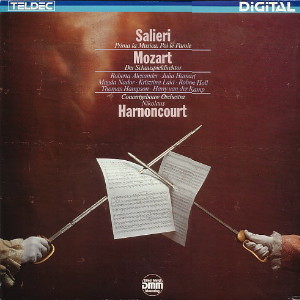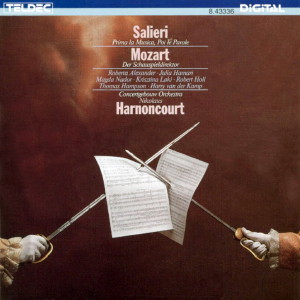 |
1 LP -
6.43336 AZ - (p) 1987
|

|
| 1 CD -
8.43336 ZK - (p) 1987 |
|
Antonio
Salieri (1750-1825)
|
|
|
|
Prima la Musica, Poi le
Parole
|
|
|
|
Divertimento teatrale un
einem Akt (Text von Giambattista Casi)
|
|
|
|
| - Sinfonia (Allegro con brio) |
2' 12" |
|
A1 |
| - Nr. 1 Duetto (Poeta, Maestro)
"Signor Poeta mio" |
4' 37" |
|
A2 |
| - Nr. 3 Recitativo accompagnato
(Eleonora) "Non dubitar, verrò" |
1' 00" |
|
A3 |
| - Nr. 4 Aria (Eleonora) "Là tu
vedraio chi sono" |
2' 42" |
|
A4 |
| - Nr. 6 Terzett (Eleonora,
Poeta, Meatro) "Cari oggetti" |
4' 57" |
|
A5 |
| - Nr. 10 Aria (Tonina - Einwürfe
Poeta, Maestro) "Via largo, largo, largo" |
5' 06" |
|
A6 |
| - Nr. 11 Cavatina (Tonina)
"Cucuzze! Che concorso" |
1' 12" |
|
A7 |
| - Nr. 13 Finale (Eleonora,
Tonina, Poeta, Maestro "Se questo mio
pianto il cor non ti tocca, Per pietà,
padrona mia" |
5' 11" |
|
A8 |
|
|
|
|
| Wolfgang Amadeus Mozart
(1756-1791) |
|
|
|
Der Schauspieldirektor, KV
486
|
|
|
|
Komödie mit Musik in einem
Akt (Text von Gottlieb Stephan dem Jüngeren)
|
|
|
|
| - Sinfonia (Presto) |
3' 50" |
|
B1 |
| - Nr. 1 Arietta (Madame Herz)
"Da schlögt die Abschiedsstunde" |
3' 36" |
|
B2 |
| - Nr. 2 Rondò (Mademoiselle
Silberklang) "Bester Jüngling" |
2' 53" |
|
B3 |
| - Nr. 3 Terzett (Madame Herz,
Mademoiselle Silberklang, Monsieur
Vogelsang) "Ich bin die erste Sängerin" |
6' 19" |
|
B4 |
| - Nr. 4 Schlußgesang
(Vaudeville) (Madame Herz, Mademoiselle
Silberklang, Monsieur Vogelsang, Buff)
"Jeder Künstler strebt nach Ehre" |
5' 19" |
|
B5 |
|
|
|
|
| Prima
la Musica, Poi le Parole |
Der Schauspieldirektor
|
|
|
|
|
Robert
Holl, Maestro
|
Magda
Nador, Madame Herz |
|
| Thomas
Hampson, Poeta |
Krisytina
Laki, Mademoiselle
Silberklang |
|
| Roberta
Alexander, Donna Eleonora |
Thomas
Hampson, Monsieur
Volgelsang
|
|
| Julia
Hamari, Tonina |
Harry
van der Kamp, Buff |
|
|
Nikolaus
Harnoncourt,
Violoncello (Solo in
Schlußgesang) |
|
|
|
Concertgebouw Orchestra,
Amsterdam
|
|
| Nikolaus
Harnoncourt, Dirigent |
|
|
Luogo e data
di registrazione
|
| Concertgebouw, Amsterdam
(Olanda) - maggio 1986 |
|
Registrazione
live / studio
|
| studio |
Producer / Engineer
|
| - |
Prima Edizione
CD
|
Teldec - 8.43336 ZK - (1 cd) -
49' 18" - (p) 1987 - DDD
|
Prima
Edizione LP
|
Teldec - 6.43336 AZ - (1 lp) -
49' 18" - (p) 1987 - Digital
|
|
|
Notes
|
Mozart`s
Schauspieldirektor
and Salieri’s Prima
la
Musica were
composed for the same
occasion; both were
commissioned by the
Emperor Joseph II and
dealt with the sarne
subject - the creation
of an opera and the
establishment of an
opera company. Both
works had their
premieres on February
7th 1786
in the Orangery at Schönbrunn.
Just as the main topic
of the two little
operas highlights and
most cunningly
parodies the
competition between
rival singers, so
these two works
represent in
themselves a
competition unique in
the history of music
theatre; by Imperial
decree the newly
created German opera,
The Singspiel
pitted itself, as it
were, against the Italian
opera buffa to prove
its viability. Salieri
had an advantage in
that his librettist
(Giambattista Casti)
was vastly superior to
Mozart’s (Stefanie).
This was why the plan
of the Emperor, who
presumably was hoping
for Mozart and German
opera to win the day,
failed. - The Orangery
was a long, narrow
building with small
stages at each end, on
which the orchestras
were seated. The
audience was placed
between them like so
many umpires; they
only needed to tum
round. - The evening
was a triumph for
Salieri and Italian
opera; the Schauspieldirektor
was a flop.
On February 8th,
1786, the “Wiener
Zeitung” carried the
following report: “On
Tuesday H.M. the
Emperor arranged a
festivity in honour of
their Highnesses the
Governors General of
the Royal &
Imperial Netherlands
and a company of the
local nobility.
Invitations were
extended to 40
cavaliers (including
Prince Poniatowsky),
who chose their ladies
and drove in pairs,
either in barouches or
in closed carriages,
along with His
Imperial Majesty, who
escorted Her Highness
the Archduchess
Christine. They left
the Imperial residence
at 3 o’clock
for Schönbrunn
and alighted at the
Orangery, which was
arranged for the
reception of the
guests and for
luncheon in the most
charming and delicate
manner. The table
under the orange trees
was dressed most
delightfully with
indigenous and foreign
flowers, blossom and
fruit. While His
Majesty and the
distinguished foreign
and other guests were
dining, the Imperial
& Royal Court
chamber orchestra
performed on wind
instruments. At the
conclusion of the meal
the actors of the
Imperial & Royal
National Theatre
performed "Der
Schauspieldirektor,
a play with arias,
specially composed
for the occasion”
by Mozart, on a stage
erected at one end of
the Orangery. As soon
as it was over, the
Italian stage, built
at the other end of
the Orangery, became
the venue for an opera
buffa also specially
written for the
occasion entitled Prima
la musica
e poi le parole,
presented by
the company of the
Court Opera.
Throughout this time
the Orangery was splendidly
illuminated by a large
number of lights in
chandeliers and on
brackets. After 9
o’clock the whole
company returned to
town, in the same
order as before, each
carriage accompanied
by two grooms with
storm lanterns."
The present
perforrnance is based
on the New Mozart
Edition and autograph
score and on Salieri’s
dedicatory score. In
respect of tempo
and basic mood the
overtures are
strikingly similar,
but the identical
scenarios were bound
to produce parallels
of this nature. Since
the German Singspiel
contained no
recitatives, Mozart’s
work was interspersed
with extensive
dialogue passages,
whereas Salieri made
use of the customary
secco recitatives.
(These have been
omitted, as were some
of the arias, in order
to facilitate the
publication of both
works on the same
record.)
Salieri: Prima la
Musica, Poi le
Parole
After a short, stormy
overture the composer
(Maestro) informs the
librettist (Poet) in Duet
No. 1 that he
has just accepted a
commission to produce
and opera within four
days. The Poet is
outraged, declaring
that he cannot
possibly write a
complete play in so
short a time, but in
the end he is
persuaded to
co-operate.
In the following
recitative the Poet
desperately tries to
resist the demand that
he should supply the
text for music which
has already been
composed, protesting
that this procedure is
inartistic. In
addition, the Maestro
offends
him deeply by
declaring that opera
goers are not the
slightest bit
interested in the
text. They then decide
to engage their cast,
and the age-old
problem of patronage
raises its ugly head.
The Poet recommends a
soubrette who is the
mistress of a rich
benefactor prepared to
provide some money if
she gets the part.
They start an argument
about the division of
the spoils: the Poet
wants a half share,
while the Maestro
demands nine tenths! A
prima donna enters;
she prays in aid her
friendship with the
Count who has
commissioned the opera
and is most attentive
to the Maestro, while
ignoring the Poet. She
boasts of her huge
repertoire and her
successes abroad,
particularly with an
opera by Salieri. The
Maestro invites her to
sing the first
cavatina starting at
the words "Pensieri...".
The Poet
intervenes to instruct
her in the latest
fashion in
ornamentation, but she
refuses to listen to
him.
Recitative No. 3
and Aria No. 4:
The prima donna
proposes to sing
Sabino’s great aria
which opens with an
accompanied
recitative; first
she requests the Poet
to play the roles of
her partners, to
assume a “dignified
pose” and to keep
still until the end;
the Maestro
accompanies her. As
she sings the castrato
part, the ludicrous
contrast between the
heroic text and the
female soprano voice
is emphasized. The
Poet complains of her
unmusical rendering
right up to the final
chord.
She is outraged, but
intends to give proof
positive of her skill
in a Rondo; both men
are made to assume
highly uncomfortable
and grotesque
attitudes as they
perform supporting
roles.
Ronda No. 6 is
a sad aria of
farewell, spoilt by
the Poet and Maestro
who complain of their
aching knees while
they give her her
cues; she is not to be
put off, but sings to
the bitter end, when
the two men collapse
on the ground.
The prima donna mocks
their sensitivity and
departs, confident
that she will be
engaged. - The two get
down to work. The Poet
is hard pressed to
find suitable words
for the music that is
already in existence,
but in the end they
manage to piece
together an aria and a
text after some
chopping and changing.
Now they try to fit
the soubrette into the
piece - a completely
hopeless task, since
opera seria and opera
buffa
were kept rigidly
apart. In the end they
cobble together the
buffo aria "Per
pieta, padrona
mia...". In a
duet they describe the
process of composing a
piece of music. Then
the libretto is finished,
complete with
deliberate errors in
writing and reading.
While the Poet goes to
fetch the soubrette,
the Maestro extols the
predominance of the
music over the words
and composes a buffo
aria. The soubrette,
Tonina, arrives,
arguing with the Poet.
She grumbles about the
old-fashioned operas
and contemptuously
throws the scores on
the floor. Finally she
claims to be
an allround soubrette
capable of
singing any role that
she is given. First
she pretends to be a
Quaker girl (this aria
was probably omitted
as early as the first
performance), then a
lunatic.
Aria No. 10:
The text is a
collection of utter
nonsense. She berates
the two men because
they do not weep tears
of emotion; then she
continues with her
balderdash. After the
aria proper she even
imitates a stammerer:
Aria No. 11.
In order to silence
her Poet and Maestro
praise her singing and
offer her a part in
their new opera. She
is just
starting to sight-read
her aria when the
prima donna returns.
The Maestro interrupts
Tonina’s rehearsal,
thereby infuriating
her. The prima donna
immediately wants to start
working on
her own aria. When she
discovers that a
soubrette has been
engaged in addition to
herself, she flies
into a rage.
Finale
No. 13
starts with Tonina
singing her aria in
total disregard of the
prima donna, who
begins rehearsing her
own aria at the same
time, Poet and
Maestro, in despair,
comment upon the
ensuing uproar.
Eventually they settle
their disagreement and
sing in praise of
music theatre.
Nikolaus
Harnoncourt
|
|
Nikolaus
Harnoncourt (1929-2016)
|

|

|
|